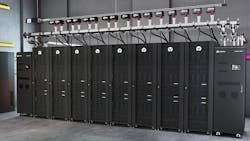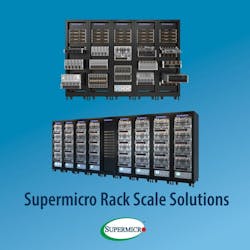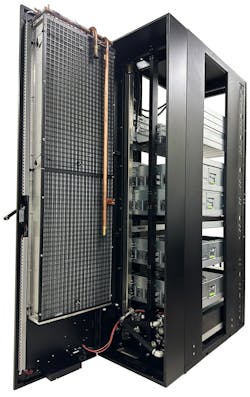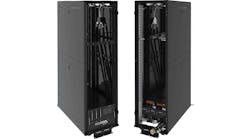Data Center AI, Liquid Cooling Growth Continues to Drive Partnerships, M&A
It's been noted before here at DCF -- and recently, especially in the year when ChatGPT flooded the white space with anticipation for workloads ranging anywhere from 70 kW up to 300 kW -- how the growth of AI and associated liquid cooling in the data center continues to drive industry partnerships and M&A activity. That we must cover it again this week is just testimony to the demands of the contemporary industry's news cycle, in terms of how much AI and liquid cooling have been in the headlines lately.
Earlier this year, data center industry watchers at The Register noted how money was beginning to flow excitingly in the space, as evidenced by global investment company KKR acquiring CoolT Systems for $270 million.
Fast-forward to now, and we see key vendors such as Vertiv taking the twin bulls of AI and liquid cooling by the horns with both hands. The company this week announced its acquisition of CoolTera Ltd. to boost its liquid cooling portfolio. The deal strengthens Vertiv’s capabilities to support deployment of AI at scale.
A Dec. 4 press release said that certain subsidiaries of the company have entered into a definitive agreement to acquire all of the shares of CoolTera, a provider of coolant distribution infrastructure for data center liquid cooling technology. The deal also involves acquistion of certain assets, including certain contracts, patents, trademarks, and intellectual property from an affiliate of CoolTera.
Founded in 2016 and based in the UK, CoolTera designs and manufactures coolant distribution units (CDU), secondary fluid networks (SFN), and manifolds for data center liquid cooling platforms. CoolTera and Vertiv have been technology partners for three years with multiple global deployments to data centers and supercomputer systems.
Vertiv said its acquisition of CoolTera adds advanced cooling technology, deep domain expertise, controls and systems, and manufacturing and testing for high density compute cooling requirements to Vertiv’s already robust thermal management portfolio, as well as key industry partnerships already in place across the ecosystem for such applications.
“This bolt-on technology acquisition is consistent with our long-term strategic vision for value creation, and further strengthens our expertise in high-density cooling solutions,” said Giordano Albertazzi, Chief Executive Officer, Vertiv. “And while the purchase price is not material to Vertiv, the acquisition is essential to further reinforce our liquid cooling portfolio, enhancing our ability to serve the needs of our global data center customers and strengthening our position and capabilities to support the needs of AI at scale.”
The acquisition is expected to close in the fourth quarter of 2023, subject to customary closing conditions. CoolTera has a track record of engineering excellence and strong customer service supported by a seasoned team of highly qualified liquid cooling engineers.
“It was a logical decision to join the Vertiv family,” said Mark Luxford, CoolTera’s Managing Director, of the acquisition.
He added, “We are excited to join the leader in data center thermal management. Vertiv has demonstrated the ability to scale technologies at a pace that is needed for AI deployment. We look forward to working as a team to deliver next generation liquid cooling technologies at the scale the industry requires. Vertiv is well-positioned to support the industry growth.”
Pivoting (ahem) directly to the chip side of affairs, the tail end November saw Vertiv announce its collaboration with Intel Corp. on a liquid cooled system for the Intel Gaudi3 AI accelerator platform, scheduled to launch in 2024. The Intel Gaudi3 AI accelerator will enable both liquid-cooled and air-cooled servers, supported by Vertiv pumped two-phase (P2P) cooling infrastructure.
Earlier this year, DCF's Rich Miller interviewed Vertiv's Global Director of Hi-Tech Development, Greg Stover, regarding what the chip revolution means for data centers.
Partnerships In Action
Supermicro is one company deploying such AI servers outfitted by Intel and Vertiv that is expanding its global manufacturing footprint (a theme also recently covered at DCF) in the U.S., Taiwan, the Netherlands, and Malaysia, while increasing worldwide rack-scale manufacturing capacity of fully tested AI, HPC, and liquid cooling rack solutions to 5,000 per month.
"With our global footprint, we now can deliver 5,000 racks per month to support substantial orders for fully integrated, liquid cooled racks, requiring up to 100kW per rack," said Charles Liang, president, and CEO of Supermicro.
With the recent announcement of the MGX product line by NVIDIA, employing the NVIDIA GH200 Grace Hopper Superchip and the NVIDIA Grace CPU Superchip systems, Supermicro continues to extend its AI-optimized servers to the industry.
Combined with its existing product line incorporating the LLM-optimized NVIDIA HGX 8-GPU solutions and NVIDIA L40S and L4 offerings, together with Intel Data Center MAX GPUs, Intel Gaudi 2, and the AMD Instinct MI series GPUs, Supermicro says it is addressing the entire range of AI training and AI inferencing applications.
Supermicro's Liang observed, "We anticipate that up to 20% of new data centers will adopt liquid cooling solutions as CPUs and GPUs continue to heat up. Our rack-scale solutions are in great demand with the development of AI technologies, an increasing part of data centers worldwide. Full rack scale and liquid cooling solutions should be considered early in the design and implementation process, which results in reduced delivery times to meet the urgent implementation requirements for AI and hyperscale data centers."
Ringing In the AI Era: Wiwynn's OCP Collaboration
Wiwynn rang in the AI era at this year's very active OCP Global Summit 2023 by demonstrating its advanced data center cooling technologies and collaborations.
As displayed at the show, Wiwynn's Aqualoop is a rack-level, OCP ORv3 liquid cooling solution with blind-mate tube features, plus an advanced cooling management system. The solution is modular and can support heat rejection by air, or external facility water.
Additionally at this year's OCP Global Summit, Wiwynn also showcased its latest collaborative project with OCP partners, billed as a total solution of a liquid-cooled AI server integrated with a standalone heat rejection unit (HRU) to enhance thermal performance for power-hungry AI acceleration servers.
"OCP Global Summit 2023 is the leading open-source community for data center IT hardware and Wiwynn has been a prominent and dedicated contributor, actively shaping through pioneering designs, collaborations, and insightful whitepapers," said Steve Helvie, VP of Emerging Markets at OCP Foundation.
In a press release, Wiwynn contends that its "cutting-edge cooling solutions can enhance thermal efficiency, directly contributing to overall power efficiency."
Helvie added, "We applaud Wiwynn's unwavering commitment to OCP technology showcased at OCP Global Summit 2023. Their innovative solutions align perfectly with OCP's mission to improve data center efficiency and sustainability."
Data Center AI M&A Watch
In the world of AI-related data center M&A, as recently noted by Data Center Frontier's sibling publication in Endeavor Business Media, Lightwave, in a deal again involving Intel, Jabil is now angling to enhance its presence in the growing pluggable transceiver space by purchasing Intel’s current silicon photonics-based pluggable optical transceiver product lines and developing future module generations.
Lightwave's Editor in Chief Sean Buckley noted that, specifically, the deal was made to enhance Jabil's profile and capabilities in what it recognizes as the incredibly fast-growing data center industry.
"This deal better positions Jabil to cater to the needs of our valued customers in the data center industry, including hyperscale, next-wave clouds, and AI cloud data centers," said Matt Crowley, Senior Vice President of Cloud and Enterprise Infrastructure at Jabil.
Crowley concluded, "These complex environments present unique challenges, and we are committed to tackling them head-on and delivering innovative solutions to support the evolving demands of the data center ecosystem. This deal enables Jabil to expand its presence in the data center value chain."

Matt Vincent
A B2B technology journalist and editor with more than two decades of experience, Matt Vincent is Editor in Chief of Data Center Frontier.







